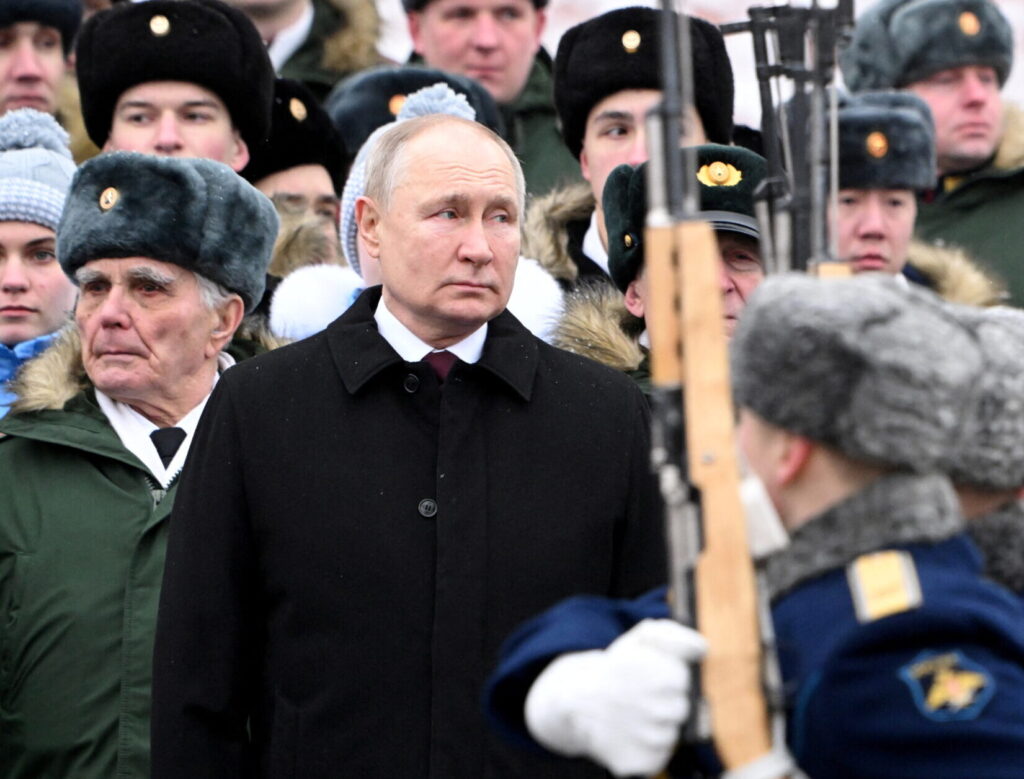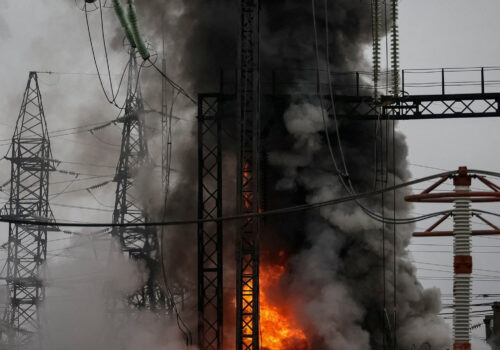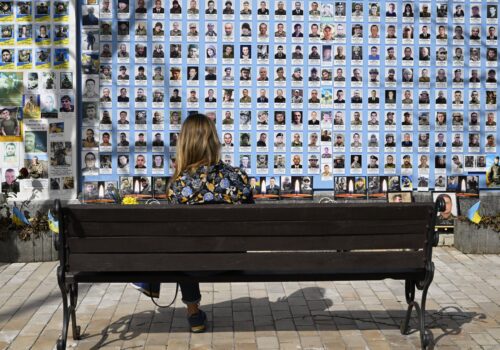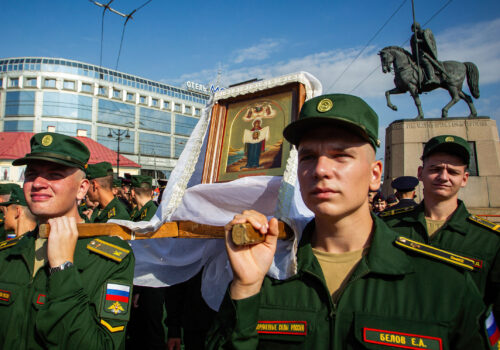Millions of Ukrainians watched with mixed emotions over the weekend as a coalition of countries came together to protect Israeli airspace from Iranian bombardment. Ukraine’s reaction was hardly surprising. After all, this impressive display of international air defense efficiency was exactly what the Ukrainians themselves have been pleading for ever since Russia’s full-scale invasion of their country began in February 2022.
In the aftermath of the operation to defend Israel, Western officials moved quickly to reject any direct comparisons with Ukraine. “Different conflicts, different airspace, different threat picture,” commented US National Security Council spokesman John Kirby. UK Foreign Secretary David Cameron was even more explicit, stating that the use of British jets to shoot down Russian drones in Ukraine would lead to a “dangerous escalation” in the war.
For Ukrainian audiences, Cameron’s anti-escalation argument was all too familiar. For the past two years, Ukraine’s Western partners have sought to strike a delicate balance between aiding the country’s self-defense and avoiding anything that could lead to a wider European war. This overriding fear of escalation has shaped the Western response to Russia’s invasion, and has been masterfully exploited by Putin to restrict military support for Ukraine.
Stay updated
As the world watches the Russian invasion of Ukraine unfold, UkraineAlert delivers the best Atlantic Council expert insight and analysis on Ukraine twice a week directly to your inbox.
On the eve of Russia’s full-scale invasion, fear of escalation was already deterring Western leaders from delivering weapons to Ukraine. Once the attack had begun, it took precious months for the Biden administration to send artillery and HIMARS missile systems. Almost an entire year had passed before Western partners finally agreed on plans to deliver a relatively small number of modern tanks.
This pattern of delays and half-measures shows no signs of changing. With the Russian invasion now well into its third year, Ukraine is still waiting to receive the first batch of F16 fighter jets. Meanwhile, officials in Kyiv are desperately calling on partners to provide them with long-range missiles and air defense systems.
The West’s preoccupation with avoiding escalation at all costs goes against basic military doctrine and has been instrumental in preventing greater Ukrainian battlefield success. When Putin’s invasion force was at its weakest in 2022, Ukraine was denied the support it needed to break through Russia’s vulnerable defensive lines in the south. By the time Kyiv’s partners had agreed to create the necessary offensive force, it was too late; Moscow had mobilized an additional 300,000 troops and fortified the front lines of the war.
Eurasia Center events

Throughout the invasion, Russia has consistently fed Western fears of escalation through a mixture of bellicose statements, back channel signalling, and clever influence operations. The Kremlin’s most effective intimidation tactic has been nuclear blackmail. In late 2022, for example, US intercepts began picking up vague but alarming “chatter” about Russian preparations for the use of nuclear weapons.
Many believe this was a deliberate ploy to boost the credibility of Putin’s public nuclear saber-rattling. It appears to have worked. The intel led to heated debate in the White House and nuclear wargaming in the Pentagon, with Biden administration officials engaging in renewed diplomatic outreach to Moscow. Crucially, concerns over a possible Russian nuclear response dampened Western enthusiasm to press home Ukraine’s advantage at a time when Putin’s army was retreating in disarray.
In addition to blunting Ukraine’s offensive capabilities, the West’s desire to avoid escalation is undermining Kyiv’s ability to defend itself. For the past two years, Ukraine has been blocked from using Western weapons against targets inside Russia. In recent weeks, US officials have even objected to Ukraine using its own weapons to attack Russian refineries.
These artificial restrictions have created an unprecedented situation that aggravates the existing imbalance of forces between Russia and Ukraine. While Russia is able to bomb Ukrainian infrastructure at will, Ukrainian commanders are severely limited in their ability to target the air bases, production facilities, and logistical hubs inside Russia that are being used to attack Ukraine.
The West’s emphasis on escalation management has prolonged the war in Ukraine, allowing Russia to overcome initial setbacks and regain the initiative. It has prevented the Ukrainian military from building on the momentum of late 2022, and has turned a dynamic war of movement into an attritional fight that heavily favors Russia. By allowing themselves to be intimidated by the threat of Russian escalation, Western leaders have granted Putin an effective veto over various categories of military aid for Ukraine. This lack of Western resolve has inevitably emboldened the Russian dictator.
Policymakers in Europe and the US must now decide whether they wish to continue with this losing strategy or finally commit to a Ukrainian victory. It is still not too late to adopt a more sensible military strategy, but the clock is ticking. Unless Ukraine is given the tools to defeat Russia on the battlefield, Putin will secure an historic victory that will transform the international security climate. If that happens, today’s emphasis on avoiding escalation will come to be seen as the biggest geopolitical blunder since the appeasement policies of the 1930s.
Mykola Bielieskov is a research fellow at the National Institute for Strategic Studies and a senior analyst at Ukrainian NGO “Come Back Alive.” The views expressed in this article are the author’s personal position and do not reflect the opinions or views of NISS or Come Back Alive.
Further reading
The views expressed in UkraineAlert are solely those of the authors and do not necessarily reflect the views of the Atlantic Council, its staff, or its supporters.

The Eurasia Center’s mission is to enhance transatlantic cooperation in promoting stability, democratic values and prosperity in Eurasia, from Eastern Europe and Turkey in the West to the Caucasus, Russia and Central Asia in the East.
Follow us on social media
and support our work
Image: Russia's President Vladimir Putin and Defence Minister Sergei Shoigu watch honour guards passing by after a wreath laying ceremony marking Defender of the Fatherland Day at the Tomb of the Unknown Soldier by the Kremlin Wall in Moscow, Russia, February 23, 2024. Sputnik/Sergei Savostyanov/Pool via REUTERS




